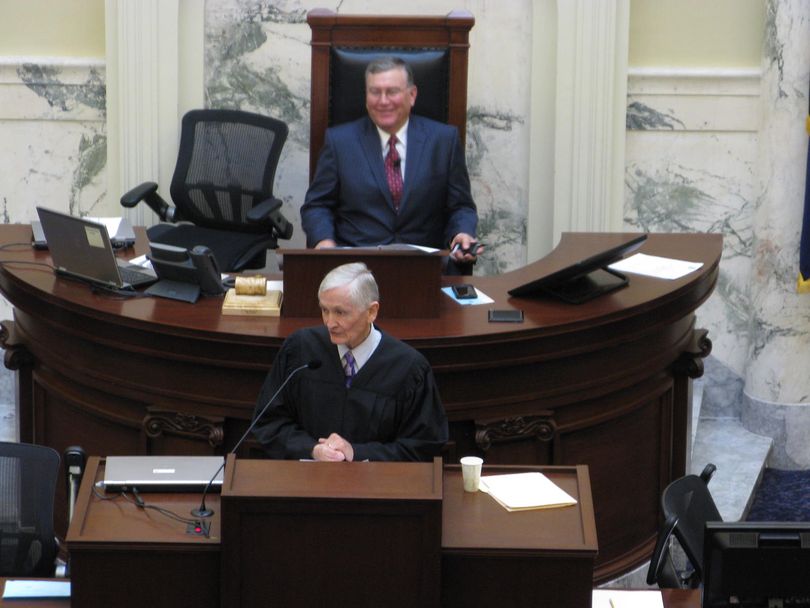Chief Justice Jones: SAPD’s office could serve as model for public defense reform

Idaho’s state appellate public defender’s office could serve as a model as lawmakers look to reform the state’s county public defender system, Idaho Supreme Court Chief Justice Jim Jones told the Senate and House today in his “State of the Judiciary” address.
“I was pleased last week to hear Gov. Otter propose that the state commit significant financial resources,” Jones told lawmakers. “The court stands ready to assist in any reasonable manner. … Our role will be advisory in nature, and I can provide some advice based on my experience as Attorney General in the 1980s.”
Jones, who served two terms as Idaho Attorney General from 1982 to 1990, said, “Then, as now, the Attorney General’s office handled virtually all criminal appeals for the state.” But unlike now, when the State Appeallate Public Defender’s office handles defense for those appeals when the defendants can’t afford a private attorney, at that time, “Such appeals were handled by contracted county public defenders or in some cases by private attorneys appointed by the judiciary. I can tell you that it was less than an ideal system. Some defendants received an adequate defense at trial and on appeal, while others clearly did not.”
“The State Appellate Public Defender has remedied the problem at the appellate level, but the problem still exists in places at the trial-court level,” Jones told lawmakers. As a result, cases come up on appeal where errors have occurred, or the defense at trial was inadequate, and those cases end up getting sent back to trial courts for re-do’s. “This is an unnecessary drain on the judicial system,” Jones said. To ensure uniformity and an appropriate defense, he said, “It appears to me that a regional or statewide system is appropriate.”
“The state appellate public defender system works well in this regard, and it should be considered as a model for the trial court level,” Jones said. “However, that is a matter within the purview of the Legislature, and I wish you well in providing an appropriate response.”
He also reported on the ongoing conversion to a online, statewide case management system for Idaho’s courts, which started with Twin Falls County over the summer and will move to Ada County next, noting that the courts will be seeking the third of five one-time appropriations next year for the project, this time asking for $2 million. He touted the state’s “problem-solving” courts, specialized courts that judges oversee after hours for defendants with drug, alcohol and mental health issues and for veterans; and noted that during the economic downturn, the courts agreed to shift $865,000 a year in funding for senior judges to a fee program dedicated to supporting those special courts. This year, it’ll ask to shift that back. “Now that state finances have stabilized, it is prudent to transfer the funding responsibility for senior judges back out of the drug court fund, and we are asking you to do that this year,” he said. Senior judges, retired judges who voluntarily take on cases and are paid 85 percent of their former pay when they do, worked 3,040 days in the past year, he said, the equivalent of 14 additional judgeships.
The courts also are seeking funding to address the growing need for language-access services for people who either don’t speak English or have communication disabilities. “The court system in Idaho has provided remarkable services to Idaho citizens in the past, and is looking forward to continuing improving those services in the future,” Jones told lawmakers.
Lt. Gov. Brad Little, at the conclusion of Jones’ remarks to the Senate, told him, “I think the relationship between the three separate but equal branches in Idaho is alive and well – we thank you for your service.”
As Jones concluded his talk to the House, Speaker Scott Bedke, R-Oakley, told him, “We have received the messages, particularly those on JFAC and the judiciary committee, and we will do our best to accommodate the requests.”
